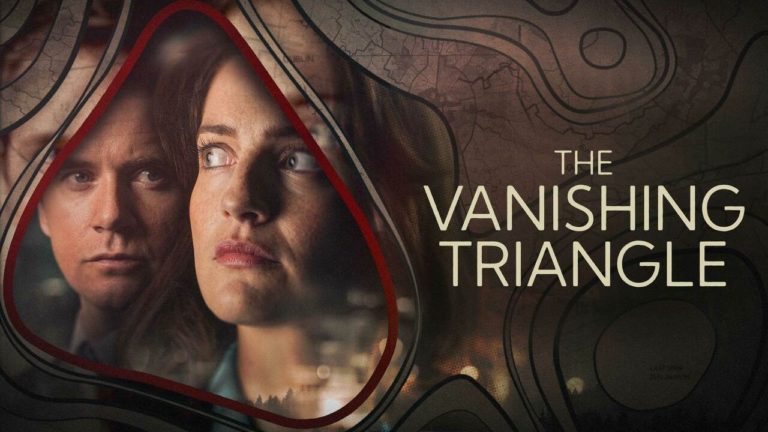
A sedated dramatization of an unsolved Irish nightmare
Season 1 |
|
Episode Guide
Episode 1: -| Review Score – 4/5
Episode 2: -| Review Score – 4/5
Episode 3: -| Review Score – 3/5
Episode 4: -| Review Score – 3.5/5
Episode 5: -| Review Score – 3/5
Episode 6: -| Review Score – 3/5
For the better part of the decade before the third millennium, Ireland lived in fear. Women shut themselves indoors following high-profile disappearances throughout the country. The worst part about these incidents – besides them remaining unsolved – is their sudden nature and departure from any pattern.
An unknown serial killer dominated media headlines by targeting a vulnerable demographic, hiding in the shadows. A lot of question marks were raised at the laggard investigative efforts by law enforcement. The scrutiny continues in AMC’s The Vanishing Triangle, a dramatisation inspired by one of the most dreaded chapters of Ireland’s post-globalization era.
India Mullen and Allen Leech star as characters on either end of the spectrum. Mullen plays Lisa Wallace, a strong-headed journalist, who gets embroiled in the aftermath of the disappearance of Amy Reynolds. Lisa hopes to put her own personal demons to rest as she finds a connection between her mother’s murder years ago. Leech plays Detective David Burkley, an honest cop struggling with his sexual identity and the chief actor in the investigation to find Amy. The show turns into an even more serious affair as two more girls – Susan, Amy’s sister, and Mandy, a high school student – are abducted.
The Vanishing Triangle uses the disappearances and the investigation as a context for character studies. Although it assumes great significance in the narrative, Lisa and David’s storylines dominate the proceedings. Both are intertwined in an inseparable loop that provides no closure for the viewers. Lisa struggles with her estranged father, Chris’ past. Chris was in a gang before being arrested for committing a murder. He feels that helping with the search for Susan and Mandy might be his way back into Lisa’s life.
David’s orientation is a ticking time bomb throughout Season 1.The 80s weren’t as forgiving and accepting as the modern day. People who didn’t fit the norm, especially in this face of social life, were terrorized by society’s morality whip. The Gardai had it the worst for cops like David, who had to live dual lives pretending to be something they’re not. David’s tangible distance from his wife, Mary, and growing affinity for Tom, his lover, place him in a difficult quandary.
The story intricately connects all these dots. However, more often than not, the uprising tension proves to be deceptive. Whenever the show promises to shift gears, it loses steam. The writers and creators try to hold our attention by throwing short-stinted subplots our way, building up to the eventual showdown with the real killer, which isn’t anything to write home about either. The Vanishing Triangle fails to carry the momentum of the investigation beyond Episode 3. After that point, it takes a backseat to the character studies, which are also far more compelling and resonating.
Coming to the visualization of Ireland from the 80s, the cinematographers do a steady job. The grainy detailing in the images and the vast expanses of the countryside add a lot of grit to the storytelling. We don’t see much of the city since the setting of the show is different. But for anyone who has grown up in such landscapes, The Vanishing Triangle is pleasingly authentic.
Mullen and Leech are extremely good. They are big reasons for sticking around and actually caring about what happens to the main characters. They both enact different complexities of emotions in their respective arcs. None of the other supporting cast gets as much screen time, although generally speaking, the ensemble turns in passionate performances.
One fundamental problem with the big reveal in the finale is its execution. In such stories, just learning the identity of the killer isn’t the whole point for the audience. That person’s motivations and modus operandi – how he committed the kidnappings or killings – capture all the excitement. The show is a big miss on that front. Perhaps because the original killer was never found and the victims and their families never had closure, the viewers are left to deal with that pain.
Another problematic feature of the storytelling is the lack of space for exposition through any lens other than that of the main characters. An underlying social commentary, which should act as a compass for reading between the lines, is not visible. As a result, the thematic fabric of the script remains limited and does not emerge fully.
The Vanishing Triangle is a thoroughly professional effort nonetheless. You won’t have complaints about the lack of determination or seriousness. It is difficult to attach yourself to the search for the serial killer but you’ll still want to keep coming back for Lisa and David.
Feel Free To Check Out More Of Our TV Show Reviews Here!
-
Verdict - 6/10
6/10

Sound balance is hopeless with characters whispering and music and sound effects too loud. Good example of how not to produce a series